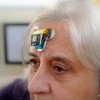NeuroVigil, the company that has developed high resolution and high throughput software algorithms to seek out changes in neurobiological activity from a single sensor, its proprietary iBrain portable neural monitor, has partnered with the American Senior Housing Association (ASHA) to gather tremendous quantities of new and highly useful data. The plan is to have thousands of volunteers living in senior housing share their brain activity data to identify how sleep, diet, or other changes in lifestyle affect the aging brain.
The iBrain device works with the proprietary SPEARS algorithm that converts EEG data into a map of brain activity. It can identify unusual patterns and can notice day to day changes in the brain’s activity. The initial launch of the program will include more than 20,000 iBrain units.
Dr. Philip Low, the CEO and founder of Neurovigil, notes that unlike trends of the past, “the data we will be generating in the 21st century will overwhelmingly come from outside the lab. It will be generated from asymptomatic humans as opposed to from diseased animals.”
“We are looking at the biggest living laboratory in the world,” said John Rios, Chairman of ASHA “We fully expect an initial launch well over 20,000 iBrain units representing a conservative initial market penetration of less than 1%.”
“We have been following the groundbreaking work of Dr. Low and NeuroVigil, and as an organization dedicated to life enrichment and improving quality of life for seniors, we could not ask for a more sophisticated neurotechnology partner to provide assistance to our leading member operators and owners who have invested tremendous energy to develop various cognitive enrichment, nutritional and wellness programs. There is a considerable need to objectively analyze the impact of these activities on a very broad scale and we are excited to be assisted by NeuroVigil,” said David Schless, President of ASHA.
source:NeuroVigil
Neurotech Goes Global: Tens Of Thousands Of Brains Coming Online

